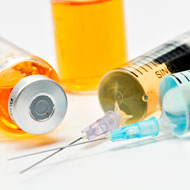APHA awarded $100,000 to develop brucellosis vaccine

Wholesale vaccination of livestock can be a cost-effective way of controlling brucellosis.
The Animal and Plant Health Agency (APHA) has been awarded $100,000 in the AgResults’ Brucellosis Vaccine Prize competition. The money will be used to develop a vaccine that is effective for use against small ruminants across the developing world.
The APHA received the funding for Phase 1 of the vaccine development and was awarded based on the agency's scientific soundness, suitable research and appropriate manufacturing capabilities.
Dr John McGiven, who is leading the project, said: “We feel the AgResults competition elevates recognition of the significance of this insidious and debilitating disease. For many years we have been focusing on improved methods for the serodiagnosis of brucellosis and this research revealed to us a route towards a new type of vaccine against brucellosis.
“This competition gave us additional incentive to pull these innovative concepts together in the belief that we can make a big difference to brucellosis control.”
Brucellosis is a devastating disease that leads to infertility, abortions and decreased milk production. It affects many animals, including small ruminants and is endemic in a number of developing countries.
Wholesale vaccination of livestock can be a cost-effective way of controlling the disease and reducing its impact on human and animal health. However, existing vaccines are unsafe for use in pregnant animals, have variable efficacy, and can harm humans.
The Brucellosis Vaccine Prize Competition, managed by AgResults, has three phases and may run for 10 years. $30 million is available to entrants, with three milestone payments at different stages.
Dr McGiven’s team is now working on Phase 2 of the vaccine development, by developing a proof of concept vaccine that meets efficacy and safety requirements. It is hoped the vaccine will deliver lasting benefits to human and animal health.



 The latest
The latest